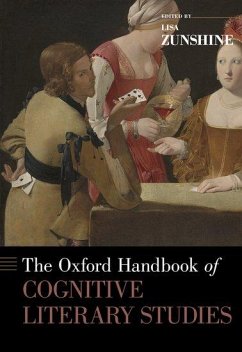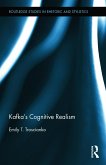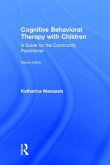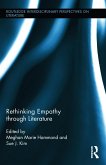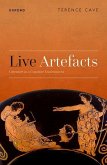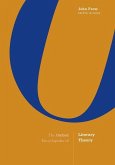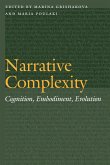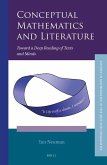Oxford Handbook of Cognitive Literary Studies
Herausgeber: Zunshine, Lisa
Oxford Handbook of Cognitive Literary Studies
Herausgeber: Zunshine, Lisa
- Gebundenes Buch
- Merkliste
- Auf die Merkliste
- Bewerten Bewerten
- Teilen
- Produkt teilen
- Produkterinnerung
- Produkterinnerung
The Oxford Handbook of Cognitive Literary Studies applies developments in cognitive science to a wide range of literary texts that span multiple historical periods and numerous national literary traditions.
Andere Kunden interessierten sich auch für
![Kafka's Cognitive Realism Kafka's Cognitive Realism]() Emily TrosciankoKafka's Cognitive Realism229,99 €
Emily TrosciankoKafka's Cognitive Realism229,99 €![Cognitive Behavioral Therapy with Children Cognitive Behavioral Therapy with Children]() Katharina ManassisCognitive Behavioral Therapy with Children171,99 €
Katharina ManassisCognitive Behavioral Therapy with Children171,99 €![Rethinking Empathy Through Literature Rethinking Empathy Through Literature]() Rethinking Empathy Through Literature229,99 €
Rethinking Empathy Through Literature229,99 €![Live Artefacts Live Artefacts]() Terence CaveLive Artefacts115,99 €
Terence CaveLive Artefacts115,99 €![The Oxford Encyclopedia of Literary Theory The Oxford Encyclopedia of Literary Theory]() The Oxford Encyclopedia of Literary Theory980,99 €
The Oxford Encyclopedia of Literary Theory980,99 €![Narrative Complexity Narrative Complexity]() Narrative Complexity86,99 €
Narrative Complexity86,99 €![Conceptual Mathematics and Literature Conceptual Mathematics and Literature]() Yair NeumanConceptual Mathematics and Literature176,99 €
Yair NeumanConceptual Mathematics and Literature176,99 €-
-
-
The Oxford Handbook of Cognitive Literary Studies applies developments in cognitive science to a wide range of literary texts that span multiple historical periods and numerous national literary traditions.
Hinweis: Dieser Artikel kann nur an eine deutsche Lieferadresse ausgeliefert werden.
Hinweis: Dieser Artikel kann nur an eine deutsche Lieferadresse ausgeliefert werden.
Produktdetails
- Produktdetails
- Oxford Handbooks
- Verlag: Oxford University Press Inc
- Seitenzahl: 680
- Erscheinungstermin: 14. Januar 2015
- Englisch
- Abmessung: 249mm x 175mm x 46mm
- Gewicht: 1318g
- ISBN-13: 9780199978069
- ISBN-10: 0199978069
- Artikelnr.: 47973604
- Herstellerkennzeichnung
- Libri GmbH
- Europaallee 1
- 36244 Bad Hersfeld
- gpsr@libri.de
- Oxford Handbooks
- Verlag: Oxford University Press Inc
- Seitenzahl: 680
- Erscheinungstermin: 14. Januar 2015
- Englisch
- Abmessung: 249mm x 175mm x 46mm
- Gewicht: 1318g
- ISBN-13: 9780199978069
- ISBN-10: 0199978069
- Artikelnr.: 47973604
- Herstellerkennzeichnung
- Libri GmbH
- Europaallee 1
- 36244 Bad Hersfeld
- gpsr@libri.de
Lisa Zunshine is Bush-Holbrook Professor of English at the University of Kentucky. She is the author or editor of ten books, including Why We Read Fiction: Theory of Mind and the Novel (Ohio State UP, 2006), Strange Concepts and the Stories They Make Possible: Cognition, Culture, Narrative (Johns Hopkins UP, 2008), Introduction to Cognitive Cultural Studies (Johns Hopkins UP, 2010) and Getting Inside Your Head: What Cognitive Science Can Tell Us About Popular Culture (Johns Hopkins UP, forthcoming in 2012).
* Lisa Zunshine, "Introduction to Cognitive Literary Studies"
* Part I: Narrative, History, Imagination
* Cognitive Historicism
* 1. Mary Thomas Crane, "Cognitive Historicism: Intuition in Early
Modern Thought"
* 2. Ellen Spolsky, "The Biology of Failure, the Forms of Rage, and the
Equity of Revenge"
* 3. Natalie M. Phillips, "Literary Neuroscience and History of Mind:
An Interdisciplinary fMRI Study of Attention and Jane Austen"
* Cognitive Narratology
* 4. Peter Rabinowitz, "Toward a Narratology of Cognitive Flavor"
* 5. H. Porter Abbott, "How Do We Read What Isn't There to Be Read?
Shadow Stories and Permanent Gaps"
* 6. James Phelan, "Rhetorical Theory, Cognitive Theory, and Morrison's
'Recitatif': From Parallel Play to Productive Collaboration"
* 7. Alan Palmer, "Listen to the Stories!:" Narrative, Cognition and
Country and Western Music"
* 8. Monika Fludernik, "Blending in Cartoons: The Production of Comedy"
* 9. Lisa Zunshine, "From the Social to the Literary: Approaching Cao
Xueqin's The Story of the Stone from a Cognitive Perspective"
* Cognitive Queer Theory
* 10. J. Keith Vincent, "Sex on the Mind: Queer Theory Meets Cognitive
Theory"
* Neuroaesthetics
* 11. Alan Richardson, "Imagination: Literary and Cognitive
Intersections"
* 12. Gabrielle Starr, "Theorizing Imagery, Aesthetics and
Doubly-Directed States"
* Part II: Emotions and Empathy
* Emotions in Literature, Film, and Theater
* 13. Patrick Colm Hogan, "What Literature Teaches Us About Emotion:
Synthesizing Affective Science and Literary Study"
* 14. Carl Plantinga, "Facing Others: Close-ups of Faces in Narrative
Film and in The Silence of the Lambs"
* 15. Noël Carroll, "Theater and the Emotion"
* Cognitive Postcolonial Studies
* 16. Patrick Colm Hogan, "The Psychology of Colonialism and
Postcolonialism: Cognitive Approaches to Identity and Empathy"
* 17. Suzanne Keen, "Human Rights Discourse and Universals of Cognition
and Emotion: Postcolonial Fiction"
* Decision Theory and Fiction
* 18. William Flesch, "Reading and Bargaining"
* Cognitive Disability Studies
* 19. Ralph James Savarese, "What Some Autistics Can Teach Us About
Poetry: A Neurocosmopolitan Approach"
* Moral Emotions
* 20. Margrethe Bruun Vaage, "On the Repulsive Rapist, and the
Difference Between Morality in Fiction and Real Life"
* 21. Fritz Alwin Breithaupt, "Empathic Sadism. How Readers Get
Implicated"
* Part III: The New Unconscious
* 22. Blakey Vermeule, "The New Unconscious: A Literary Guided Tour"
* 23. Jeff Smith, "Filmmakers as Folk Psychologists: How Filmmakers
Exploit Cognitive Biases as an Aspect of Film Narration,
Characterization and Spectatorship"
* Part IV: Empirical and Qualitative Studies of Literature
* 24. Laura Otis, "The Value of Qualitative Research for Cognitive
Literary Studies"
* 25. Marisa Bortolussi and Peter Dixon, "Revisiting the Metaphor of
'Transportation'"
* 26. Peter Dixon and Marisa Bortolusi, "Fluctuation in Literary
Reading: The Neglected Dimension of Time"
* Part V: Cognitive Theory and Literary Experience
* 27. Joshua Landy, "Mental Calisthenics and Self-Reflexive Fiction"
* 28. Elaine Auyoung, "Rethinking the Reality Effect: Detail and the
Novel"
* 29. Mark Bruhn, "Time as Space in the Structure of (Literary)
Experience: The Prelude"
* 30. Nancy Easterlin, "Thick Context: Novelty in Cognition and
Literature"
* Part I: Narrative, History, Imagination
* Cognitive Historicism
* 1. Mary Thomas Crane, "Cognitive Historicism: Intuition in Early
Modern Thought"
* 2. Ellen Spolsky, "The Biology of Failure, the Forms of Rage, and the
Equity of Revenge"
* 3. Natalie M. Phillips, "Literary Neuroscience and History of Mind:
An Interdisciplinary fMRI Study of Attention and Jane Austen"
* Cognitive Narratology
* 4. Peter Rabinowitz, "Toward a Narratology of Cognitive Flavor"
* 5. H. Porter Abbott, "How Do We Read What Isn't There to Be Read?
Shadow Stories and Permanent Gaps"
* 6. James Phelan, "Rhetorical Theory, Cognitive Theory, and Morrison's
'Recitatif': From Parallel Play to Productive Collaboration"
* 7. Alan Palmer, "Listen to the Stories!:" Narrative, Cognition and
Country and Western Music"
* 8. Monika Fludernik, "Blending in Cartoons: The Production of Comedy"
* 9. Lisa Zunshine, "From the Social to the Literary: Approaching Cao
Xueqin's The Story of the Stone from a Cognitive Perspective"
* Cognitive Queer Theory
* 10. J. Keith Vincent, "Sex on the Mind: Queer Theory Meets Cognitive
Theory"
* Neuroaesthetics
* 11. Alan Richardson, "Imagination: Literary and Cognitive
Intersections"
* 12. Gabrielle Starr, "Theorizing Imagery, Aesthetics and
Doubly-Directed States"
* Part II: Emotions and Empathy
* Emotions in Literature, Film, and Theater
* 13. Patrick Colm Hogan, "What Literature Teaches Us About Emotion:
Synthesizing Affective Science and Literary Study"
* 14. Carl Plantinga, "Facing Others: Close-ups of Faces in Narrative
Film and in The Silence of the Lambs"
* 15. Noël Carroll, "Theater and the Emotion"
* Cognitive Postcolonial Studies
* 16. Patrick Colm Hogan, "The Psychology of Colonialism and
Postcolonialism: Cognitive Approaches to Identity and Empathy"
* 17. Suzanne Keen, "Human Rights Discourse and Universals of Cognition
and Emotion: Postcolonial Fiction"
* Decision Theory and Fiction
* 18. William Flesch, "Reading and Bargaining"
* Cognitive Disability Studies
* 19. Ralph James Savarese, "What Some Autistics Can Teach Us About
Poetry: A Neurocosmopolitan Approach"
* Moral Emotions
* 20. Margrethe Bruun Vaage, "On the Repulsive Rapist, and the
Difference Between Morality in Fiction and Real Life"
* 21. Fritz Alwin Breithaupt, "Empathic Sadism. How Readers Get
Implicated"
* Part III: The New Unconscious
* 22. Blakey Vermeule, "The New Unconscious: A Literary Guided Tour"
* 23. Jeff Smith, "Filmmakers as Folk Psychologists: How Filmmakers
Exploit Cognitive Biases as an Aspect of Film Narration,
Characterization and Spectatorship"
* Part IV: Empirical and Qualitative Studies of Literature
* 24. Laura Otis, "The Value of Qualitative Research for Cognitive
Literary Studies"
* 25. Marisa Bortolussi and Peter Dixon, "Revisiting the Metaphor of
'Transportation'"
* 26. Peter Dixon and Marisa Bortolusi, "Fluctuation in Literary
Reading: The Neglected Dimension of Time"
* Part V: Cognitive Theory and Literary Experience
* 27. Joshua Landy, "Mental Calisthenics and Self-Reflexive Fiction"
* 28. Elaine Auyoung, "Rethinking the Reality Effect: Detail and the
Novel"
* 29. Mark Bruhn, "Time as Space in the Structure of (Literary)
Experience: The Prelude"
* 30. Nancy Easterlin, "Thick Context: Novelty in Cognition and
Literature"
* Lisa Zunshine, "Introduction to Cognitive Literary Studies"
* Part I: Narrative, History, Imagination
* Cognitive Historicism
* 1. Mary Thomas Crane, "Cognitive Historicism: Intuition in Early
Modern Thought"
* 2. Ellen Spolsky, "The Biology of Failure, the Forms of Rage, and the
Equity of Revenge"
* 3. Natalie M. Phillips, "Literary Neuroscience and History of Mind:
An Interdisciplinary fMRI Study of Attention and Jane Austen"
* Cognitive Narratology
* 4. Peter Rabinowitz, "Toward a Narratology of Cognitive Flavor"
* 5. H. Porter Abbott, "How Do We Read What Isn't There to Be Read?
Shadow Stories and Permanent Gaps"
* 6. James Phelan, "Rhetorical Theory, Cognitive Theory, and Morrison's
'Recitatif': From Parallel Play to Productive Collaboration"
* 7. Alan Palmer, "Listen to the Stories!:" Narrative, Cognition and
Country and Western Music"
* 8. Monika Fludernik, "Blending in Cartoons: The Production of Comedy"
* 9. Lisa Zunshine, "From the Social to the Literary: Approaching Cao
Xueqin's The Story of the Stone from a Cognitive Perspective"
* Cognitive Queer Theory
* 10. J. Keith Vincent, "Sex on the Mind: Queer Theory Meets Cognitive
Theory"
* Neuroaesthetics
* 11. Alan Richardson, "Imagination: Literary and Cognitive
Intersections"
* 12. Gabrielle Starr, "Theorizing Imagery, Aesthetics and
Doubly-Directed States"
* Part II: Emotions and Empathy
* Emotions in Literature, Film, and Theater
* 13. Patrick Colm Hogan, "What Literature Teaches Us About Emotion:
Synthesizing Affective Science and Literary Study"
* 14. Carl Plantinga, "Facing Others: Close-ups of Faces in Narrative
Film and in The Silence of the Lambs"
* 15. Noël Carroll, "Theater and the Emotion"
* Cognitive Postcolonial Studies
* 16. Patrick Colm Hogan, "The Psychology of Colonialism and
Postcolonialism: Cognitive Approaches to Identity and Empathy"
* 17. Suzanne Keen, "Human Rights Discourse and Universals of Cognition
and Emotion: Postcolonial Fiction"
* Decision Theory and Fiction
* 18. William Flesch, "Reading and Bargaining"
* Cognitive Disability Studies
* 19. Ralph James Savarese, "What Some Autistics Can Teach Us About
Poetry: A Neurocosmopolitan Approach"
* Moral Emotions
* 20. Margrethe Bruun Vaage, "On the Repulsive Rapist, and the
Difference Between Morality in Fiction and Real Life"
* 21. Fritz Alwin Breithaupt, "Empathic Sadism. How Readers Get
Implicated"
* Part III: The New Unconscious
* 22. Blakey Vermeule, "The New Unconscious: A Literary Guided Tour"
* 23. Jeff Smith, "Filmmakers as Folk Psychologists: How Filmmakers
Exploit Cognitive Biases as an Aspect of Film Narration,
Characterization and Spectatorship"
* Part IV: Empirical and Qualitative Studies of Literature
* 24. Laura Otis, "The Value of Qualitative Research for Cognitive
Literary Studies"
* 25. Marisa Bortolussi and Peter Dixon, "Revisiting the Metaphor of
'Transportation'"
* 26. Peter Dixon and Marisa Bortolusi, "Fluctuation in Literary
Reading: The Neglected Dimension of Time"
* Part V: Cognitive Theory and Literary Experience
* 27. Joshua Landy, "Mental Calisthenics and Self-Reflexive Fiction"
* 28. Elaine Auyoung, "Rethinking the Reality Effect: Detail and the
Novel"
* 29. Mark Bruhn, "Time as Space in the Structure of (Literary)
Experience: The Prelude"
* 30. Nancy Easterlin, "Thick Context: Novelty in Cognition and
Literature"
* Part I: Narrative, History, Imagination
* Cognitive Historicism
* 1. Mary Thomas Crane, "Cognitive Historicism: Intuition in Early
Modern Thought"
* 2. Ellen Spolsky, "The Biology of Failure, the Forms of Rage, and the
Equity of Revenge"
* 3. Natalie M. Phillips, "Literary Neuroscience and History of Mind:
An Interdisciplinary fMRI Study of Attention and Jane Austen"
* Cognitive Narratology
* 4. Peter Rabinowitz, "Toward a Narratology of Cognitive Flavor"
* 5. H. Porter Abbott, "How Do We Read What Isn't There to Be Read?
Shadow Stories and Permanent Gaps"
* 6. James Phelan, "Rhetorical Theory, Cognitive Theory, and Morrison's
'Recitatif': From Parallel Play to Productive Collaboration"
* 7. Alan Palmer, "Listen to the Stories!:" Narrative, Cognition and
Country and Western Music"
* 8. Monika Fludernik, "Blending in Cartoons: The Production of Comedy"
* 9. Lisa Zunshine, "From the Social to the Literary: Approaching Cao
Xueqin's The Story of the Stone from a Cognitive Perspective"
* Cognitive Queer Theory
* 10. J. Keith Vincent, "Sex on the Mind: Queer Theory Meets Cognitive
Theory"
* Neuroaesthetics
* 11. Alan Richardson, "Imagination: Literary and Cognitive
Intersections"
* 12. Gabrielle Starr, "Theorizing Imagery, Aesthetics and
Doubly-Directed States"
* Part II: Emotions and Empathy
* Emotions in Literature, Film, and Theater
* 13. Patrick Colm Hogan, "What Literature Teaches Us About Emotion:
Synthesizing Affective Science and Literary Study"
* 14. Carl Plantinga, "Facing Others: Close-ups of Faces in Narrative
Film and in The Silence of the Lambs"
* 15. Noël Carroll, "Theater and the Emotion"
* Cognitive Postcolonial Studies
* 16. Patrick Colm Hogan, "The Psychology of Colonialism and
Postcolonialism: Cognitive Approaches to Identity and Empathy"
* 17. Suzanne Keen, "Human Rights Discourse and Universals of Cognition
and Emotion: Postcolonial Fiction"
* Decision Theory and Fiction
* 18. William Flesch, "Reading and Bargaining"
* Cognitive Disability Studies
* 19. Ralph James Savarese, "What Some Autistics Can Teach Us About
Poetry: A Neurocosmopolitan Approach"
* Moral Emotions
* 20. Margrethe Bruun Vaage, "On the Repulsive Rapist, and the
Difference Between Morality in Fiction and Real Life"
* 21. Fritz Alwin Breithaupt, "Empathic Sadism. How Readers Get
Implicated"
* Part III: The New Unconscious
* 22. Blakey Vermeule, "The New Unconscious: A Literary Guided Tour"
* 23. Jeff Smith, "Filmmakers as Folk Psychologists: How Filmmakers
Exploit Cognitive Biases as an Aspect of Film Narration,
Characterization and Spectatorship"
* Part IV: Empirical and Qualitative Studies of Literature
* 24. Laura Otis, "The Value of Qualitative Research for Cognitive
Literary Studies"
* 25. Marisa Bortolussi and Peter Dixon, "Revisiting the Metaphor of
'Transportation'"
* 26. Peter Dixon and Marisa Bortolusi, "Fluctuation in Literary
Reading: The Neglected Dimension of Time"
* Part V: Cognitive Theory and Literary Experience
* 27. Joshua Landy, "Mental Calisthenics and Self-Reflexive Fiction"
* 28. Elaine Auyoung, "Rethinking the Reality Effect: Detail and the
Novel"
* 29. Mark Bruhn, "Time as Space in the Structure of (Literary)
Experience: The Prelude"
* 30. Nancy Easterlin, "Thick Context: Novelty in Cognition and
Literature"

